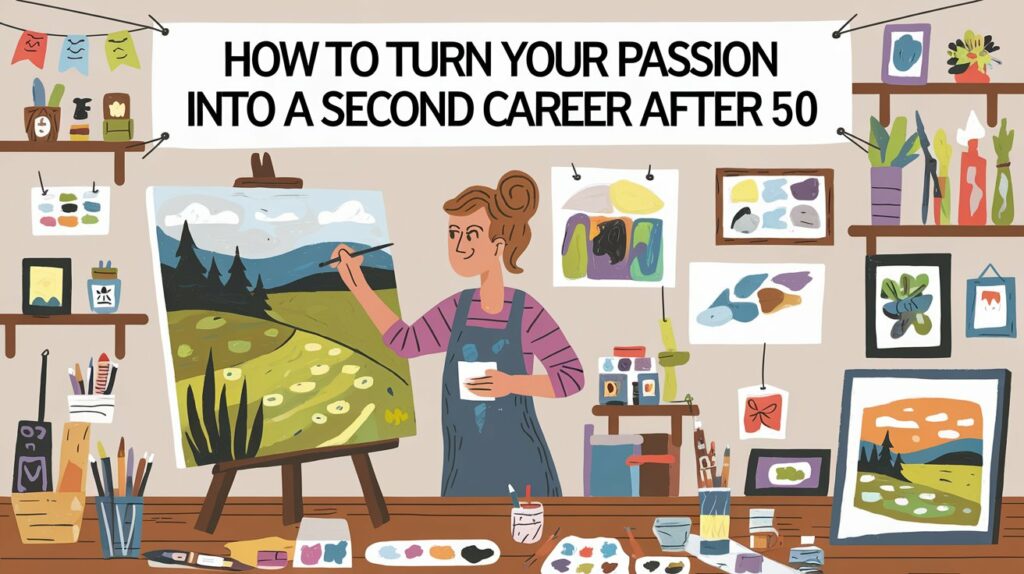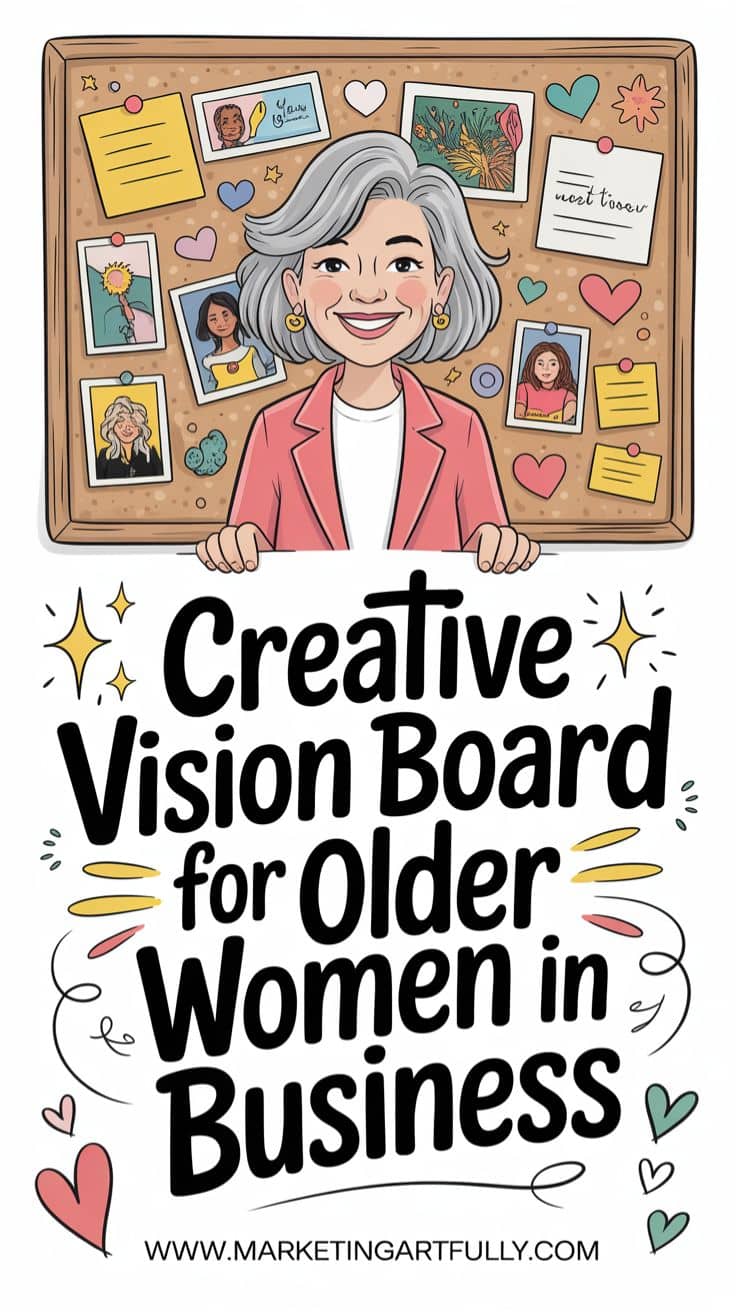Ever thought of turning your passion into a second career after 50? You're not alone! Many adults are making career changes later in life. They find that doing what they love leads to a fulfilling job.
It's never too late to start. Your life experience is a big help on this journey!

More people over 50 are changing careers for meaningful work. AARP research shows this trend is real. It proves that older adults are still full of life and talent.
In this article, I'll share steps, stories, and encouragement. They'll help you navigate this exciting new chapter.
Let's embrace the idea that our passions are worth chasing, no matter our age. Get ready to learn how to make this dream come true!
My Chasing Passion Story
I was always a career woman! I wanted to be marketing executive until I found out that at the Vice President level you don't get to do marketing anymore, instead it is managing budgets and people at that point!
Then I spent about 7 years owning a marketing company until I noticed that I was not actually making any money, instead I was paying my employees and barely scraping by, so I pivoted!
I had always loved blogging so I started doing that full time, making videos and running my newsletter and I have never been happier!
Understanding the Importance of Following Your Passion

Following your passion can change your life, especially when you're looking for a fulfilling career later on. I've found that when I do what I love, I feel more enjoyment and satisfaction. Passionate work makes the daily tasks easier and helps you grow personally!
Studies show that meaningful work boosts mental health. People who follow their passions often feel less stressed and happier. This connection gives them a sense of purpose, helping to avoid feeling stuck over time.
- Passion promotes personal growth: Exploring new areas pushes you to learn new skills and knowledge.
- Fulfilling work enhances satisfaction: Doing what you love brings you joy every day.
- A supportive community grows: Passion connects you with others who share your interests, creating networking chances.
By focusing on your passion, you open up to endless learning and exciting experiences. Every step into your passion adds to a fulfilling life's journey.
Identifying Your Passion: Skills and Interests
Finding your passion can be tricky. It often needs self-reflection and a true skills assessment. I find a Venn diagram helpful. It has three areas: what you love, what you're good at, and what the world needs.
Several tools can help in this journey. For example, the What Are 3 Things You Like To Do? – Finally Focus for Creative Entrepreneurs worksheet can help you figure it out!
Listing hobbies and interests that make you happy can also spark new ideas. Asking friends and family for their thoughts can also help. They might see strengths in you that you don't.
- List hobbies and activities you enjoy.
- Reflect on moments when you felt fulfilled.
- Utilize self-assessment tools for deeper insights.
- Gather feedback from close friends and family.
Overcoming Fears and Obstacles After 50
Starting a new career after 50 can stir up many emotions. Fear and self-doubt often creep in, making things seem too hard. I remember feeling anxious about whether my skills could actually become an income producing career.
But, many people successfully move past these doubts. Studies show older workers bring a wealth of experience, which employers find valuable. Here are some ways to tackle these challenges:
- Practice mindfulness. It helps calm your mind and keeps you focused.
- Seek support from friends, family, or professional networks. Talking about your journey can offer comfort and motivation.
- Reflect on past achievements. Remembering your successes can boost your confidence and reduce self-doubt.
Knowing you're not alone can be comforting. Your experiences add to the diversity of any workplace. Embracing this new chapter may bring fears, but it also opens doors to growth and happiness.

Building a Plan to Transform Your Passion into a Career
After finding your passion, making a career plan is key. This plan should have clear goals and a timeline. It helps you move smoothly from one career to another.
Setting Realistic Goals
Setting realistic goals is vital for your transition. Align your goals with what you can do, like your time and family. Here’s how to set effective goals:
- Be specific about what you want to achieve.
- Ensure your goals are measurable to track progress.
- Make them achievable with the resources and time you have.
- Keep your goals relevant to your passion.
- Time-bound your goals to encourage a sense of urgency.
Creating a Timeline for Your Transition
A timeline is like a roadmap for your career change. It helps you see your journey. Here’s a sample timeline to consider:
- Enroll in a relevant course within the first month.
- Network with professionals in your field during the next two months.
- Launch your project by the end of the next six months.
This plan keeps you focused and motivated. Achieving each goal on time boosts your confidence and motivation.
Networking and Connecting with Like-Minded Individuals
Building a support network is key when starting a new career. I found that being around people who share your interests boosts your motivation and creativity. Start by looking at online platforms like LinkedIn and forums for your industry to grow your network. Also, attending workshops and events can help you make real connections in your community.

Utilizing Social Media for Networking
Social media is a great tool for networking today. Sites like LinkedIn let you show off your skills and meet industry pros. Join groups related to your field and take part in discussions. Sharing your experiences and insights can help you make valuable connections and get advice from others in your field.
Joining Local and Online Communities
Look for groups in your area or online that match your interests. Sites like Meetup offer chances to meet people with similar passions. I went to local workshops and seminars, which led to new opportunities. Being part of these communities makes your journey feel less lonely and more collaborative.
Finding Resources and Education for Your New Career
Starting a new career means you'll need to learn new things. There are many resources out there to help you. Learning never stops, especially when you're moving into a new field.
Online Courses and Certifications
Online courses can really change the game. Sites like Skillshare and Udemy have lots of options. You can pick what interests you most.
Community colleges also offer great deals for adults. These programs are affordable and can be a great choice.
Certificates from these courses make your resume stand out. They show you're serious about your new career. I found that taking several courses made me feel more ready for my new job.
Mentorship Opportunities
A mentor can be a huge help. They bring experience and insights to the table. Many groups offer mentorship programs.
I was amazed by how willing people were to share their knowledge. Working with a mentor helped me understand my field better. It also grew my professional network!
Embracing Your Best Self in a New Career
Starting a new career after 50 is a big chance for self-acceptance and discovery. It's about seeing and celebrating the experiences that make you who you are. Every step you take helps you grow personally and professionally.
Seeing failures as chances to learn has helped me become stronger. This way of thinking boosts my self-acceptance and lets me face challenges with confidence. When I start a new career, keeping a balance between work and life is key. It's also important to take care of myself.
- Recognize your achievements, both big and small.
- Practice self-compassion during tough moments.
- Dedicate time to activities that bring joy and relaxation.
- Set boundaries to ensure a sustainable work-life balance.
By following these ideas, you can build a rewarding career that shows your best self. Remember, growing professionally is a lifelong journey. Every moment is a chance to learn and succeed.
Conclusion
Turning your passion into a second career after 50 is more than a dream. It's a reality that can bring deep fulfillment. You bring a unique perspective to this new chapter, thanks to all your past experiences.
Having a clear plan and community support are key during this journey. They help a lot!
Embracing your best self takes courage and an open mind. You'll face challenges, but learning new skills and finding people who share your interests can help. This leads to fulfilling work.
This journey is about finding purpose and passion in your work. My own journey has shown me the amazing possibilities when you take the leap. So, take that first step. Your fulfilling future is waiting for you.





